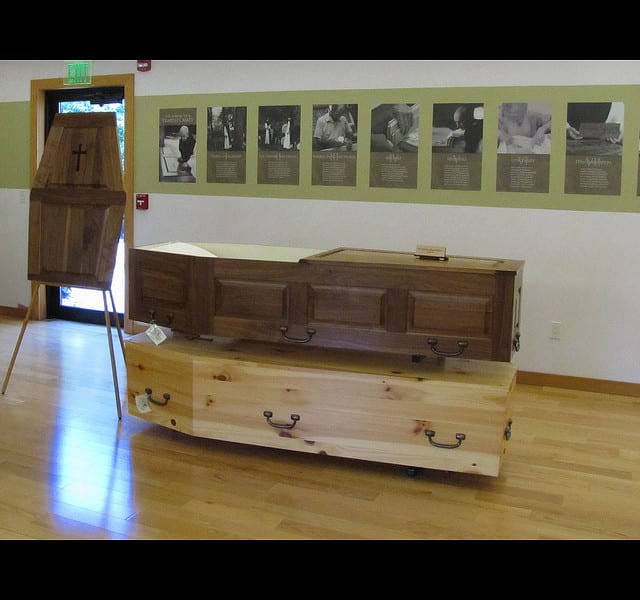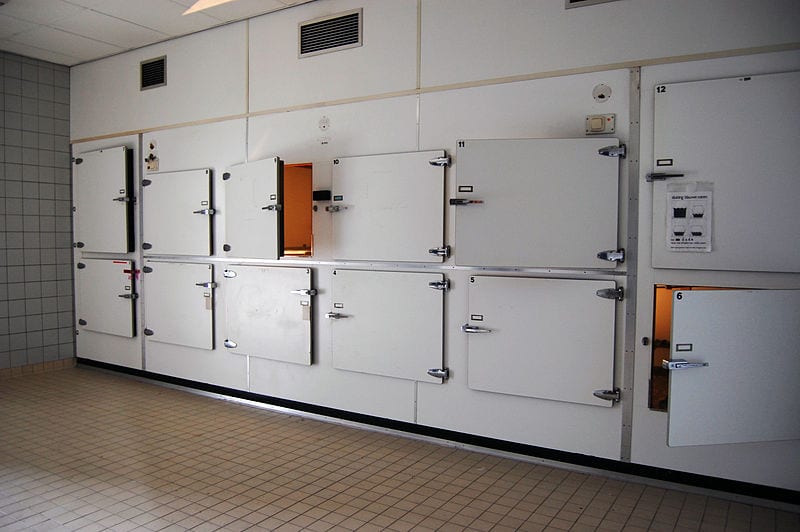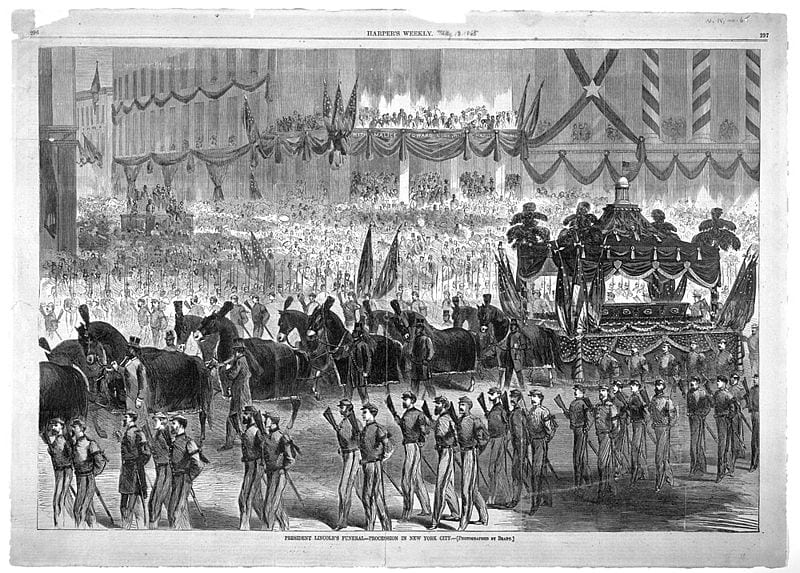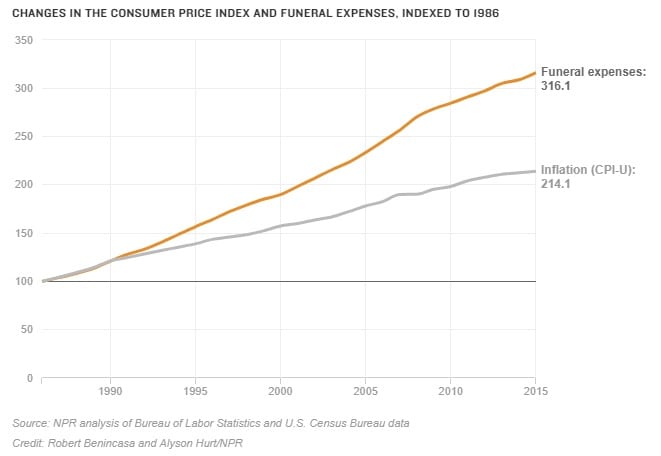There are two constants in life: death and taxes. If we’re being honest, however, there is one more thing – paying an exorbitant amount for a funeral. As if the death of a loved one wasn’t stressful enough, the average funeral can cost upwards of $7,000! Honestly, it’s kind of surprising that there aren’t any deaths reported from the shock of seeing a funeral bill.

Photo Credit: Pixabay
The Business of Grief
Before we begin, it’s only fair to point out that the funeral industry is a business, and any business needs to make a certain degree of profit in order to survive. A lot of people working in this industry (also known as the “death care industry”) joined up because they’ve experienced loss themselves, and want to help others going through the same thing. It’s unreasonable to expect them to offer their services at cost/for a loss. There’s also something to be said about the convenience of getting everything – flowers, caskets/urns, preservation services, limos, etc. – under one roof rather than having to go around and get everything separately.

Photo Credit: Wikimedia Commons
Still, the fact that there are professional courses for funeral directors with titles like “Upselling Without Upsetting the Client,” designed to convince customers to go up to 20% over their budget for things like luxury procession cars and white doves at the memorial isn’t exactly the kind of thing that inspires trust. You should also be aware of the “grief counselors” that some funeral homes employ. They’re usually just a glorified salesperson whose main job is to try to guilt you into spending more money.

Photo Credit: Pixabay
In fact, a shockingly honest Reddit post by a funeral director points out that funeral home employees are often quite adept at gauging your financial status, as well as picking out which members of the family are easier to sway into buying more. A great tip for avoiding this is to bring along a more level-headed friend or family member, someone who isn’t as close to the deceased and can provide a more objective point of view.
It’s also pretty unsettling to find out that a staggering number of America’s funeral homes are owned by a single corporation – Service Corporation International (SCI). SCI buys up mom-and-pop shops all over the country without changing the names so that nobody’s any wiser, while inflating prices by up to 72% more for the same services at independent funeral homes.

Photo Credit: YouTube
Show Me the Money
One of the reasons people experience an unpleasant surprise upon seeing the bill is because the funeral industry is very deliberately opaque. A lot of funeral homes will give you a list of services to choose from without including any information about how much they cost. They only hit you with the total once you’ve already got everything picked out, at which point you’re likely to just pony up the cash in order to avoid feelings of guilt or embarrassment.

Photo Credit: Pixabay
Fortunately, you have legal rights as a consumer that protect you from the various scams that unscrupulous funeral directors may try to spring on you. Consumers shopping for the perfect funeral service are protected by the Federal Trade Commission’s Funeral Rule, which legally entitles you to see a list of prices for all services offered (although, having been passed in pre-internet 1980s, the rule only applies to in-person or over-the-phone inquiries).
The FTC conducts undercover investigations to ensure compliance with this rule, though, sadly, they’ve found that nearly 1 in 4 funeral homes fail to do so. These offenders can choose to either work with the FTC to improve their practice and move towards compliance, or face hefty federal fines.
Many funeral homes also offer “package deals” that might seem attractive on the surface, but could actually cost you quite a bit in frivolous extras. Don’t fall for it – funeral homes are also legally required to provide all of those services individually, as well as to provide you with an itemized price list so you can really see what you’re paying for.

Photo Credit: Pixabay
Shop Smart
Another reason that people often end up paying small fortunes for a service is general apathy and ignorance of the marketplace. Given how much is on their minds close after the death of a loved one, most people fail to adequately shop around in order to get the best deal. Often, people go with whatever option is closest, or possibly something that they’ve used previously (even if they hated it). While it may not seem pleasant, shopping around could save you thousands of dollars – in a stunning NPR report, investigators found they could save over $1,000 on the exact same service simply by going to the funeral home across the street!

Photo Credit: Pixabay
While convenience is certainly a lovely thing, you shouldn’t let a 15-30 minute drive deter you from potentially saving enough to cover a mortgage payment. Mourning aside, if that’s possible, funerals should be treated as any large purchase would be. After all, you wouldn’t buy the first car you see from the first dealer you visit, so why should this be any different?

Photo Credit: Imgflip
A great resource to use is the Funeral Consumers Alliance, a national consumer organization that monitors the funeral industry. They were instrumental in getting the FTC to pass the Funeral Rule, and are currently trying to get them to update the rule to include seeing prices online. The FCA has local chapters all around the country and can assist you in the process of comparing prices.
Casket Case
Speaking of buying the first thing you see, let’s talk about caskets. They account for a hefty portion of the total cost of a funeral, but studies show that most people buy one of the first three models that they’re shown. As such, it’s clearly in the funeral director’s interest to arrange their showroom like a car dealership and show you the most expensive models first. More often than not, the less expensive options are tucked away somewhere in the back or down in a basement. Even if they do show you these options, they’re often deliberately painted in ugly colors to make them less attractive.
By law, you are entitled to request to see a catalog of all available models. This is important to remember because most funeral homes aren’t selling you the model you see in the showroom anyway – those are for display only and they almost always have to ship in whatever you picked out. Additionally, you can always shop online for caskets from other suppliers like Walmart, Costco, or BestPriceCaskets, all of which have several models for under $1,000. You are under no obligation to buy a casket directly from the funeral home, and they are required to honor your choice. They also can’t charge you any additional fees for using a third-party casket – if they do, they’re in violation of FTC law.

Photo Credit: Flickr
Another way that funeral homes try to exploit your general lack of knowledge is by trying to sell you “protective,” waterproof caskets, allegedly to better preserve your loved one’s body. However, this is one funeral scam that’s looked down upon even by industry insiders! These caskets are usually equipped with a rubber gasket to make them watertight. First of all, that gasket generally costs about $20-25, but funeral homes will charge you an extra $700+ for models that feature them. Furthermore, while it might seem like a good idea to preserve the body, the truth is that nothing is actually going to stop a body’s decay. In fact, protective caskets tend to trap in the gasses produced by decomposition, which can cause the casket to explode!

Photo Credit: Pixabay
For this reason, most mausoleums actually expressly forbid the use of these types of caskets.
Preserve Your Money
Another major money-maker for funeral homes is embalming. A lot of funeral homes may try to tell you that embalming is mandatory by law, but both the FTC and the FCA say there are no state laws mandating embalming unless you’re transporting the body across state lines/via airlift. Embalming is a good option if there is going to be a significant amount of time (greater than 3 days) between the death and the viewing of the body. But refrigeration of the body is almost always a viable and much less expensive alternative.

Photo Credit: Wikimedia Commons
Modern embalming became popular after President Abraham Lincoln’s body was toured around the country following his assassination. While it was a necessity in that particular case due to the amount of time involved, the vast majority of people do not need to be embalmed – it’s just a costly extra. This is especially true if you’re doing a direct burial or cremation without any viewing.

Photo Credit: Wikimedia Commons
Additionally, embalming uses formaldehyde as the chief preserving agent, which is a seriously terrible thing to release into the environment – it’s a known carcinogen.
Prepaid Predicament
Although it might seem tempting to enter a “prepaid” agreement with a funeral home, it’s best to avoid this. I admit, it’s nice to think that all your arrangements will be taken care of and paid in advance (sometimes even at a discounted rate). The problem is that there isn’t really a ton of regulation around this, and there have been plenty of cases of funeral homes simply walking off with the money.

Photo Credit: Pixabay
They might also go out of business before you’re ready, leaving you with no remedy, or claim that they need to charge additional fees due to “inflation costs” (despite the fact that, according to Department of Labor data analyzed by NPR, funeral costs have steadily outpaced inflation for decades). Then there’s the scenario where the death happens to occur in another state: there are very few legal provisions for being able to transfer the prepaid funds to another funeral home.

Photo Credit: NPR
Instead of prepaying, consumer advocates advise setting up a “payable on death” account at the bank. Not only is this a much safer, more reliable option, it also accrues interest like a savings account!
Knowledge is Power
By now, it should be pretty clear that the single best thing you can do to avoid paying an arm and a leg for a funeral is to be as informed as you possibly can. Get familiar with the Funeral Rule, as well as who you can contact at the FTC and/or FCA in order to report a violation of your rights. Make sure you shop around to get the best deal, and never do business with a funeral home that makes you feel uncomfortable.

Photo Credit: NBC
Ultimately, while it can be pretty unsettling to confront your own (or a loved one’s) mortality, spending a few hours getting informed about your options will save you and your family from getting buried in debt down the road.






